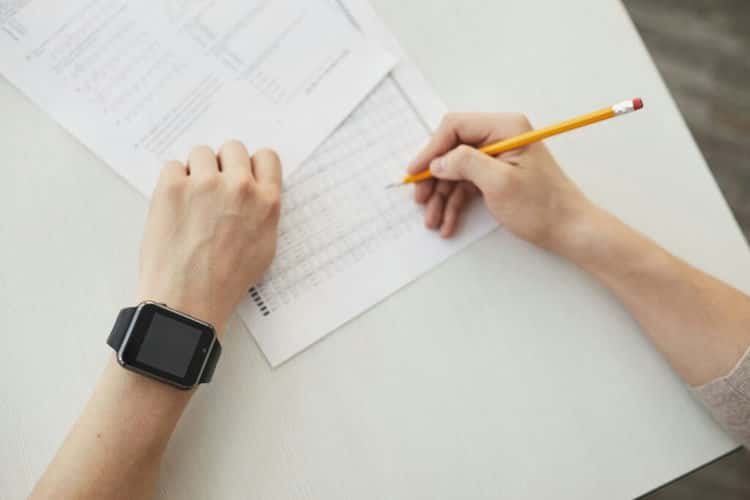Introduction
Picture this: it’s exam season, and you’re surrounded by textbooks, highlighted notes, and an overwhelming sense of dread. You’ve been reading and rereading your notes for weeks, but still feel underprepared. Sound familiar? Many students struggle with finding effective revision strategies, often resorting to passive methods that don’t translate to exam success. There’s a powerful tool that many students overlook or misuse: past papers.
When used correctly, past papers can transform your revision from merely absorbing information to actively applying it. They offer invaluable insights into exam structure, timing, and question styles while building your confidence and exam technique. The key phrase here is “when used correctly” – simply completing past papers without a strategic approach won’t yield the best results.

At SmoothMaths, we help students master past papers with expert guidance tailored to the 11+, 13+, GCSE and IGCSE levels. Here’s how to make past papers work for you.
Create Real Exam Conditions
One of the biggest shocks on exam day can be the pressure of the timed environment. This is why simulating real exam conditions is crucial when working through past papers. Set a timer, find a quiet space, put away your notes, and commit to working without interruptions or help.
This practice builds mental stamina and helps you manage exam anxiety. When you’ve repeatedly experienced the pressure of exam conditions in practice, the real thing becomes less intimidating. When you choose Functional Skills, you’ll also get better at pacing yourself, ensuring you have enough time to attempt all questions.
Mark Like an Examiner
Completing past papers is only half the battle – how you mark them matters just as much. Always use the official mark scheme and be strict with yourself. Don’t award partial marks where the mark scheme wouldn’t.
This disciplined approach teaches you how examiners think and what they’re looking for in answers. You’ll start to understand the specific language and structure that earns full marks. For mathematical subjects, you’ll learn where method marks are awarded even if the final answer is incorrect—crucial knowledge for maximizing your score.
Review Mistakes Properly
Finding mistakes is valuable, but understanding why you made them is transformative. When reviewing errors, ask yourself: Was it a knowledge gap? A calculation error? A misinterpretation of the question? Did you run out of time?
Create a dedicated “error log” where you record mistakes, their causes, and the correct approaches. Revisit this log regularly to ensure you’re addressing weak areas. This targeted approach is far more effective than simply redoing entire papers. Remember, the goal isn’t just to complete past papers—it’s to learn from them.
Refine Your Exam Technique
Past papers aren’t just about content knowledge—they’re perfect for honing your exam technique. Practice showing your work methodically, structuring longer answers effectively, and approaching multi-step questions in a logical order.
Pay attention to command words like “explain,” “calculate,” or “evaluate,” and ensure you’re responding appropriately to each. Many students lose marks not because they don’t know the material, but because they don’t present their knowledge in the way examiners expect. Regular past paper practice helps you internalize these expectations.
Space Them Out for Impact
Cramming all your past paper practice into the week before exams drastically reduces its effectiveness. Instead, space them out over several weeks or even months, with reflection time between each paper.
This spaced practice allows your brain to consolidate learning and helps identify patterns in your performance over time. It also prevents burnout and keeps your revision fresh and engaging. Consider allocating specific days of the week for past paper practice, with other days focused on addressing knowledge gaps identified in your most recent papers.
Work Through Papers in Reverse
Start with the most recent past papers and work backwards. Exam specifications and question styles evolve over time, so newer papers will most closely match what you’ll face in your examination.
After mastering recent papers, older ones still offer valuable practice—just be aware of any syllabus changes or question style differences. Your teacher or tutor can help identify which sections of older papers remain relevant. This approach ensures you’re focusing on the most relevant content first while still benefiting from the breadth of practice materials available.
Do a Full “Mock Exam Week”
As your actual exams approach, consider dedicating a full week to mock examinations. Create a schedule that mirrors your real exam timetable, complete full papers each morning, and use afternoons for thorough review sessions.
This intensive practice serves as a dress rehearsal for the real thing, helping you fine-tune your time management and build confidence. It also identifies any last-minute areas needing attention before your actual exams. Mock weeks are particularly beneficial for spotting subjects where you might need to adjust your revision strategy.
Conclusion
Past papers are far more than just practice questions—they’re a window into the exam process and a powerful tool for active learning. When approached strategically, they transform passive revision into dynamic preparation that builds both knowledge and confidence. Remember that effective past paper practice is about quality, not just quantity—understanding your mistakes and refining your approach is what truly drives improvement.
By creating realistic conditions, marking strictly, reviewing thoroughly, and spacing your practice, you’ll develop the skills and confidence needed to perform at your best when it matters most. Past papers shouldn’t be an afterthought in your revision plan—they should be at its core.
Looking for more structured support? SmoothMaths offers expert tuition and revision programmes built around real past papers to help students succeed in 11+, 13+, and GCSE maths exams. Visit our website to learn how we can help you master past papers and achieve exam success.











